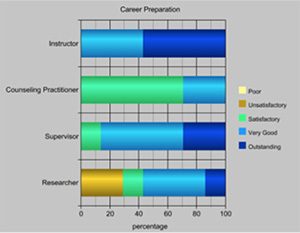PhD in Counseling Student Survey Results
The PhD in Counseling program at Montclair State University conducted a survey in December 2016, asking students about their impressions of the PhD program. Out of a total number of 42 students enrolled as of this survey distribution, we received 15 respondents. The questions followed the Council for Accreditation of Counseling and Related Educational Program (CACREP) guidelines for evaluating program performance. The survey asked about the quality of the PhD program courses, experiential areas of the curriculum, and core CACREP competency areas (e.g. professional identity).
Students were asked 48 questions to describe their experience of the program, using a rating scale of poor, unsatisfactory, satisfactory, very good, or outstanding to quantify their responses. The questions were segmented into four subgroups: 1) required courses, 2) experiences, 3) additional components, and 4) career preparation. The following graphs present the results as a percentage of how the 15 respondents rated the program.
I. REQUIRED COURSES
The following graph shows the results of required courses. Most survey respondents reported that the core curriculum was “very good” or “outstanding”. Of those who responded to the question, all found the Clinical, Leadership, and Organizational Assessment course and the Career Counseling course to be “very good” or “outstanding”. Four areas were rated with a high minority of “poor” or “unsatisfactory” ratings: Counseling Supervision (22%, n=2), Internship I: Instructorship (25%, n=2), Advanced Qualitative Methods (28%, n=2), and Advanced Quantitative Methods (28%, n=2).
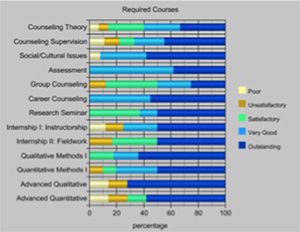
II. EXPERIENCES
The following two graphs represent students’ experiences within supervision, teaching, research, leadership, and clinical components of the program. This cluster of questions constituted most of the CACREP standards of competency in a PhD program. Most of the survey respondents rated these areas as “outstanding” or “very good”. All respondents rated the teaching element of building rapport with their students as “very good” or “outstanding”, in addition to rating faculty mentorship as “very good” or “outstanding”. Three of the fifteen respondents (23%) rated the learning of academic writing skills as “unsatisfactory” or “poor”. The question regarding the quality of grants and awards was not included in the graph, because of a low (80%) nonresponse rate.
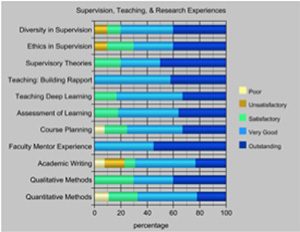
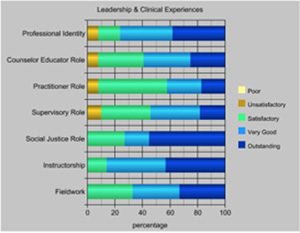
III. ADDITIONAL COMPONENTS
The following graph includes the results of the survey that asked about additional program components. These questions sought to ascertain the students’ feelings about being supported, along with questions related to cognate courses and overall impressions of the program. Almost all survey respondents indicated that these areas were “satisfactory” or above. Questions about job search assistance (74% nonresponse) and dissertation guidance (80% nonresponse) were omitted from the graph due to low response rates.
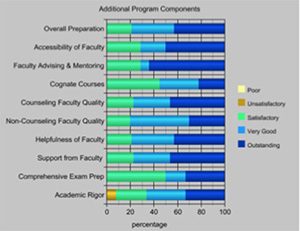
IV. CAREER PREPARATION
The last graph represents survey questions that explored how students believed that the program helped them to prepare for their careers after graduation. A high percentage of survey respondents indicated that the program helped them in four areas of career preparation.
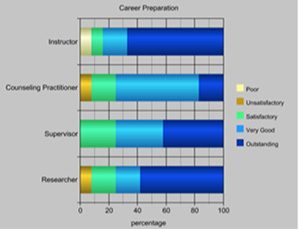
PhD in Counseling Alumni Survey Results
The Montclair State University PhD in Counseling program sent a survey to alumni of the program in February 2017, asking 46 questions about the same elements as asked on the student survey. Seven out of 16 total alumni responded to the survey and denoted their rating of the program using a scale with the items: poor, unsatisfactory, satisfactory, and outstanding.
I. REQUIRED COURSES
The first graph shows percentages of the ratings given by alumni of core curriculum courses. Many of the alumni responded with “very good” or “outstanding” ratings. All survey respondents rated the Career Counseling course and the Advanced Qualitative Methods course as “very good” or “outstanding”. Four of the respondents (67%) indicated that their Social and Cultural Issues in Counseling class was “poor” or “unsatisfactory”. Two respondents (28%) rated their Quantitative Methods I class as “poor” or “unsatisfactory”, with 57% (n=4) rating the course as “satisfactory”. Three alumni respondents (43%) (n=3) rated Advanced Quantitative Methods as “poor” or “unsatisfactory”.
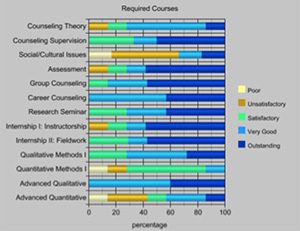
II. EXPERIENCES
The graphs below show ratings in the experience areas of supervision, teaching, research, leadership, and clinical. Most of the responses were “very good” or “outstanding”. All alumni who responded to the survey rated diversity in supervision (cultural responsiveness) as “very good” (67%) or “outstanding” (33%). Alumni respondents rated building rapport in teaching as “very good” (33%) or “outstanding” (67%). All the respondents indicated that the experience of professional identity was “very good” (14%) or “outstanding” (86%). Two survey respondents (29%) indicated that the grants and awards experience of the program was “unsatisfactory”. Four respondents (57%) rated the experience of learning and applying quantitative methods as an “unsatisfactory” part of the program.
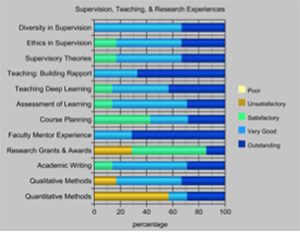
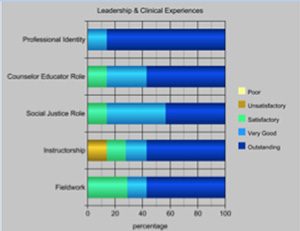
III. ADDITIONAL COMPONENTS
The next graph highlights additional program components. A clear majority of the factors were rated as at least “satisfactory”. All the alumni respondents noted that faculty advising/mentoring, helpfulness of faculty, support from faculty, and dissertation guidance were “very good” or “outstanding” facets of the PhD program.
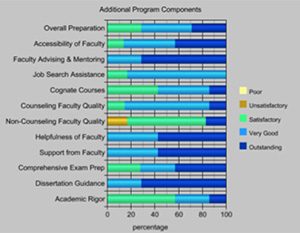
IV. CAREER PREPARATION
The last graph portrays the ratings given by alumni respondents about how the program fostered their careers. All respondents rated their career preparation as an instructor to be “very good” or “excellent”. Two alumni respondents (29%) rated their preparation as researchers to be “unsatisfactory”.
